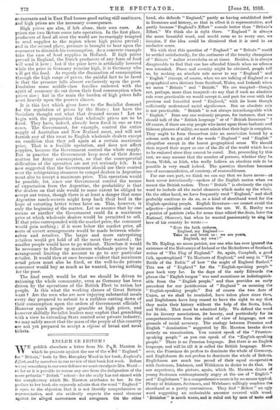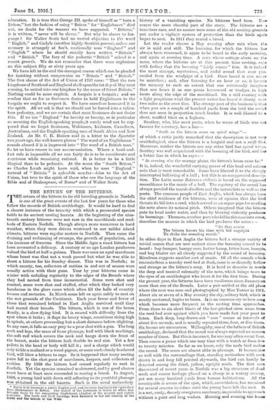ENGLIEH CR IRITIFII
WEpublih elsewhere a letter from Mr. Pat B. ,Marston in which he protests against the use of the w Tn.!England " for "Britain," both by Mrs. Humphry Ward in her book, England's Effort, and by ourselves in our review of that book last week. Before we say something in our own defence we must exculpate Mrs. Ward— so far as it is possible to rescue any one from the indignation of the more pedantic " British" school—for she really has not sinned with the complacency which Mr. Marston attributes to her. In the preface to her book she expressly admits that the word " England " is open to the objection that it is not literally comprehensive or representative, and she evidently expects the usual clamour against its alleged narrowness and arrogance. On the other
hand, she defends "England," partly as having established itself in literature and history, so that in effect it is representative, and partly because "England's Effort" sounds better than "Britain's Effort." We think she is right there. " England " is always the more beautiful word, and would seem so to every one, we imagine, if the idea could be dismissed that it is used in an exclusive sense.
We wish that this question of " England " or " Britain " could be settled satisfactorily, for the outbursts of the touchy champions of " Britain " rather overwhelm us at times. Besides, it is always disagreeable to find that one has offended friends when no offence was intended. Peace and security might be attained, people tell us, by making an absolute rule never to say " England " and " English " (except, of course, when we are talking of England as a geographical area distinct from Scotland, Wales, and Ireland) when we mean " Britain " and "British." We are tempted--though not, perhaps, more than tempted—to say that if such an absolute rule were practicable we would accept it, and part for ever with the precious and beautiful word "England," with its loose though sufficiently understood racial significance. But an absolute rule is not practicable. " British " is not always interchangeable with "English." Does any one seriously propose, for instance, that we should talk of the "British language" or of "British literature"
Of course, if there are any people who insist upon those barbaric and hideous phrases of utility, we must admit that their logic is complete. They ought to form themselves into an association bound by a solemn oath to get rid of the words " England " and " English " altogether except in the barest geographical sense We should then regard their anger as one of the ills of the world which have to be endured since they cannot be cured. But, proceeding by this test, we may assume that the number of persons, whether they be Scots, Welsh, or Irish, who really believe an absolute rule to be possible is very small indeed. The question therefore becomes one of accommodation, of courtesy, of reasonableness.
For our own part, we think we can say that we have never—at least never intentionally—spoken of the English nation when we meant the British nation. Thera " British " is obviously the right word to include all the racial elements which make up the whole. On the other hand, we have frequently used "England," and shall probably continue to do so, as a kind of shorthand word for the English-speaking people. English literature—we cannot avoid the adjective—justifies and consecrates the use. W. E. Henley was a patriot of patriots (who for some time edited the Scots, later the National, Observer), but when he wanted passionately to sing his love of his country he wrote :—
" Ever the faith endures, England, my England :- Take us and break us : we are yours,
England, my own!"
So Mr. Kipling, no mean patriot, nor one who has ever ignored the existence of the Mulvaneys of Ireland or the McAndrews of Scotland, writes of "The Flag of England." So, again, Campbell, a good Celt, apostrophized "Ye Mariners of England," and sang in "The Battle of the Baltic" of how "the might of England flushed." This use of " England " for the "English-speaking people" goes back very far. In the days of the early Edwards the phrase the "English tongue" was used sometimes as indistinguish- able from the "English people," and thus provides an early precedent for our justification of " England " as meaning the "English-speaking people." But of course the two Acts of Union, as we shall be reminded, have taken place since then, and Englishmen have long ceased to have the right to say that they make their history without the help of the Scots, Irish, and Welsh. That must be admitted fully. We defend the word for its literary associations, its beauty, and particularly for its comprehensiveness from the point of view of language, not on grounds of racial accuracy. The analogy between Prussian and English " domination " suggested by Mr. Marston breaks down entirely on examination. You cannot speak of the "Prussian- speaking people" as you can speak of the "English-speaking people." There is no Prussian language. But there is an English language, and will be till it is called the British language. More- over, the Prussians do profess to dominate the whole of Germany, and Englishmen do not profess to dominate the whole of Britain. Englishmen are much too proud of their equal co-operation with Scotsmen, Irishmen, and Welshman to desire to do that. In our experience, the picture, again, which Mr. Marston draws of young Scotsmen contemptuously angry at the use of " English " and" Englishmen " in a comprehensive sense is by no means typicaL Plenty of Irishmen, Scotsmen, and Welshmen willingly condone the
shorthand as a pretty convenience. They find " Briton " an ugly word suggesting an undesirable ancestor covered with woad. ' Britisher " is much worse, and is ruled out by men of taste and
a
education. It is true that George III, spoke of himself as "born a Briton," but the fashion of using " Briton " for" Englishman" died oat, no doubt for the reasons we have suggested. "Britons," it is viritten, "never will be slaves." But why be slaves to lan- guage? Sir Walter Scott had no rood objection to the word "English," and Carlyle (another highly Scottish person), urdels our memory is strangely at fau't, continually uses "England" and " English " where he should strictly have written " Britain " and "British." The fury of the pedantic " British " school is a recent growth. We do not remember that there were explosions on this subject fifty or sixty years ago.
We have left to the end the strongest reason which can be pleaded for insisting without compromise on " Britain " and "British." The first clause of the Act of Union of 1707 runs: "That the two kingdoms of Scotland and England shall upon the 1st day of May next ensuing, be united into one kingdom by the name of Great Britain." Nothing could be more explicit. A bargain is a bargain ; and we confess that so far as Scotsmen desire to hold Englishmen to the bargain we ought to respect it. We have ourselves honoured it in the spirit. All we ask is that we should not be forced into a ridicu- lous pedantry, and we are certain that most Scotsmen do not desire this. If we use " England " for brevity or beauty, or in particular as meaning the English-speaking people, it surely need not be sup- posed that we forget Scotsmen, Welshmen, Irishmen, Canadians, Australians, and the English-speaking men of South Africa and New Zealand. As Mr. 0. R. Haines said in a letter to the Spectator two years ago, the well-known phrase" The word of an Englishman" sounds absurd if it is improved into "The word of a British man." So let us have reason in our accommodation. Where a hard-and- fast rule is impossible all we can fairly do is to be considerate and courteous while remaining rational. It is better to be a little illogical than to be pedantic. At the worst the "South Briton," as Charles Lamb might have said, when he uses " England " instead of " Britain " is splendide menlax—false to the Act of Union, but true to the spirit of those who use the language of the Bible and of Shakespeare, of Burns* and of Walter Scott.



































 Previous page
Previous page